2017-2018学年人教版必修一Unit 2 English around the world Period 1 Reading 课件(25张)
文档属性
| 名称 | 2017-2018学年人教版必修一Unit 2 English around the world Period 1 Reading 课件(25张) | 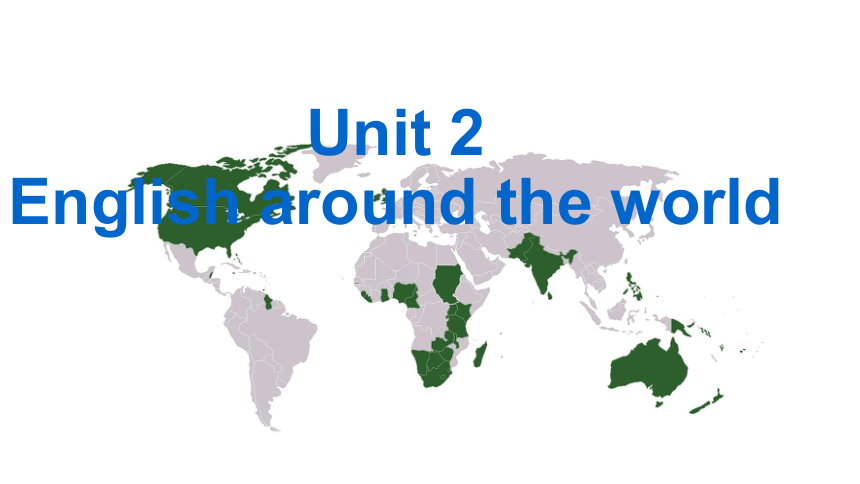 | |
| 格式 | zip | ||
| 文件大小 | 2.4MB | ||
| 资源类型 | 教案 | ||
| 版本资源 | 人教版(新课程标准) | ||
| 科目 | 英语 | ||
| 更新时间 | 2017-10-11 22:50:58 | ||
图片预览


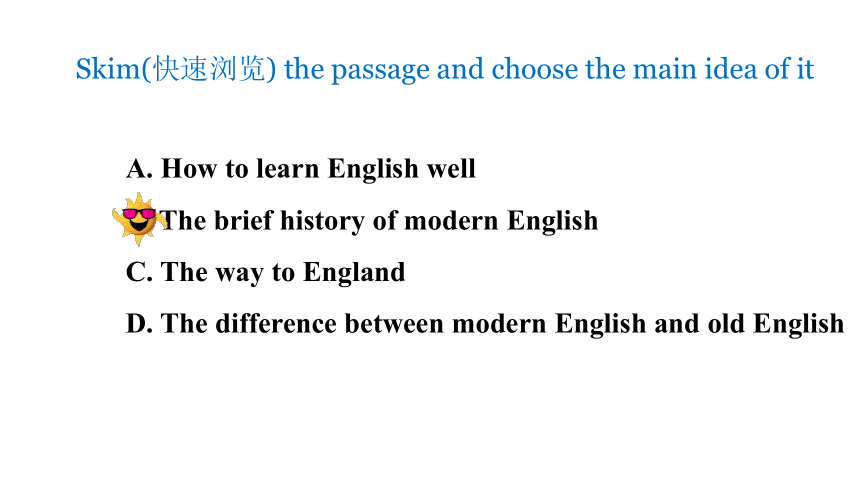
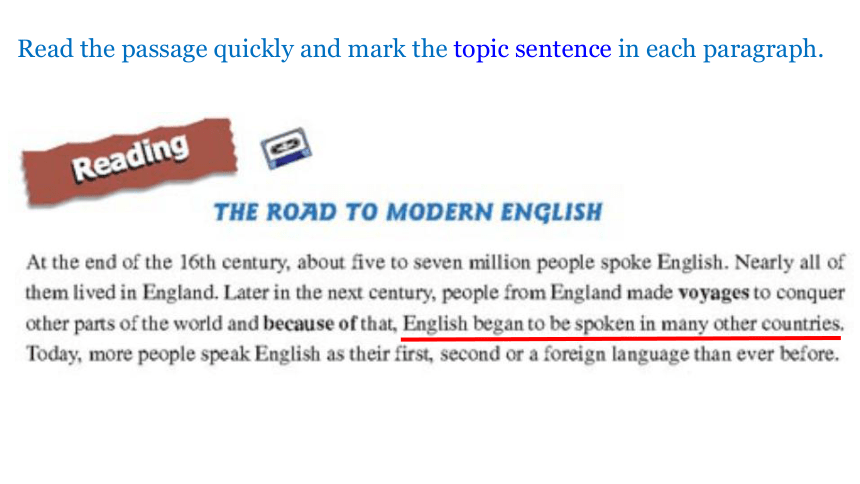
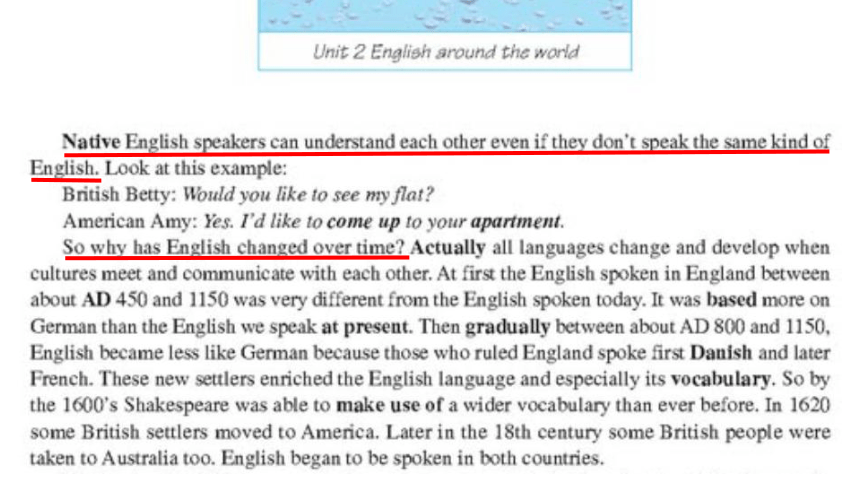
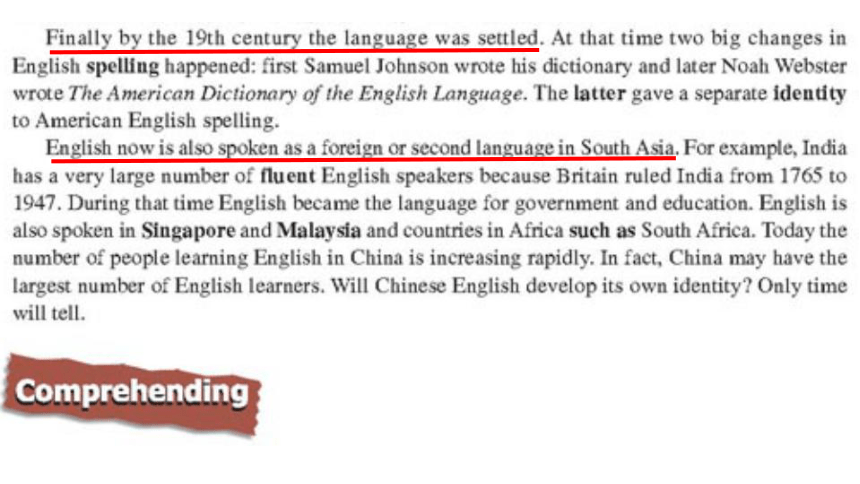
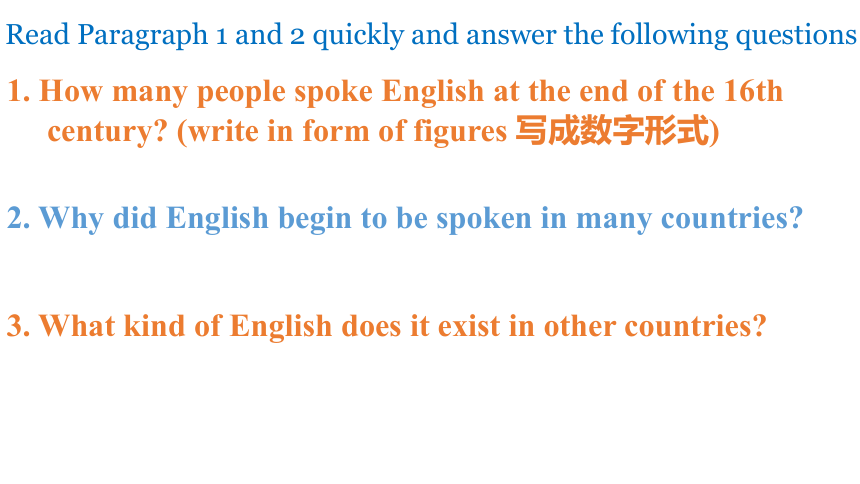
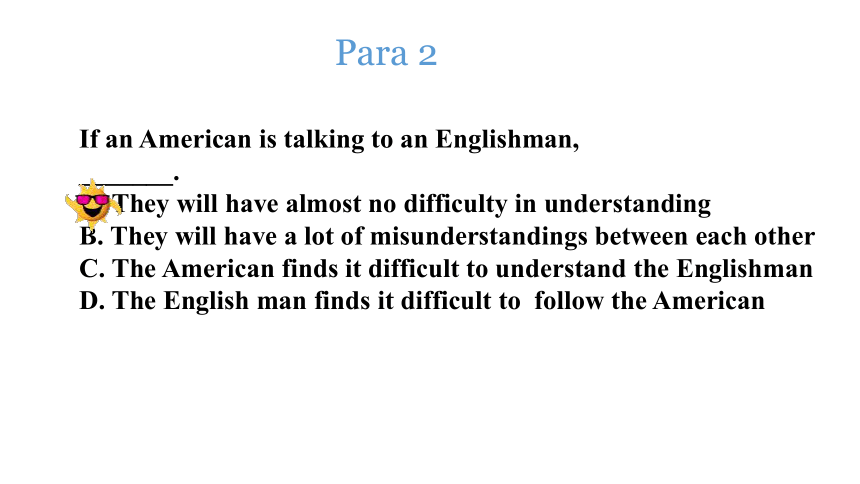
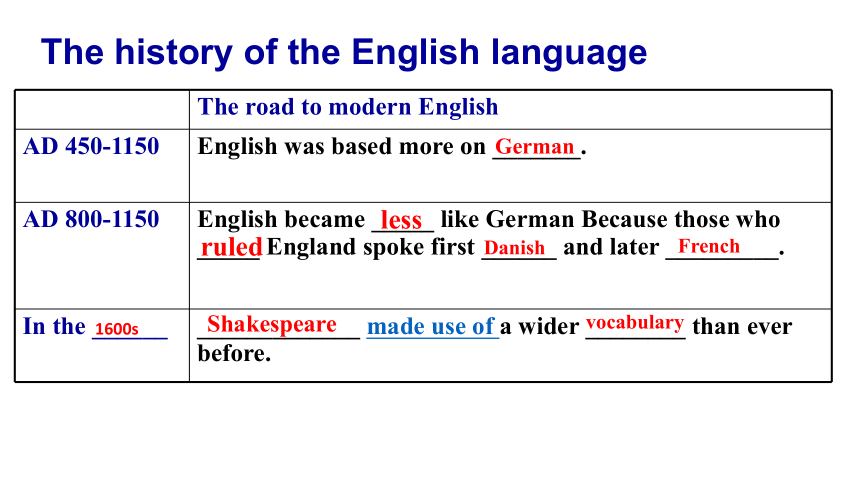
文档简介
课件25张PPT。Unit 2 English around the worldTHE ROAD TO MODERN ENGLISHLook at the title and guess what the passage is about.A. How to learn English well
B. The brief history of modern English
C. The way to England
D. The difference between modern English and old EnglishSkim(快速浏览) the passage and choose the main idea of itRead the passage quickly and mark the topic sentence in each paragraph.Read Paragraph 1 and 2 quickly and answer the following questions1. How many people spoke English at the end of the 16th century? (write in form of figures 写成数字形式)2. Why did English begin to be spoken in many countries?3. What kind of English does it exist in other countries?If an American is talking to an Englishman,
_______.
A. They will have almost no difficulty in understanding
B. They will have a lot of misunderstandings between each other
C. The American finds it difficult to understand the Englishman
D. The English man finds it difficult to follow the AmericanPara 2GermanThe history of the English languagelessruledShakespeareDanishFrenchvocabulary1600sAmericaAustralia government and education
English spellingdictionaryThe American Dictionary of
the English Language.South AsiaChina South AfricaRead the passage carefully and decide whether the statements are true or false.In pairs discuss:Why do you think people all over the world want to learn English?Why do you think more people in the world want to learn Chinese?英国文学史上最杰出的戏剧家
西方文艺史上最杰出的作家之一
全世界最卓越的文学家之一William Shakespeare 诺亚·韦伯斯特 Noah WEBSTER (1758–1843)是文学选集和拼写词典的作者,他花费了几十年时间研究编写他自己的字典。1828年出版The American Dictionary of the English Language 《美国英语词典》二册,该书成为继英国约翰逊《英语词典》之后的经典辞书。在这本书中,韦伯斯特首次引入了他以后一直坚持使用的标志性的东西,包括美国式拼写(例如center而不应该是centre, honor而不是honour, program而不是programme,等等) 韦氏死后,开印刷所的兄弟二人G.Merriam和C.Merriam买了韦家的版权,以Merriam-Webster公司的名义出版Merriam-Webster's 词典。1847年修订第一版印出,合订成一巨册,并配上插图。1890年改书名为《韦氏国际英语词典》(意即通用于英语国家)。1909年又改称《韦氏新国际英语词典》,并于1934年出了第二版。1961年出版《韦氏国际英语词典(第三版)》
The American Dictionary of the English LanguageEg.我们应该充分利用好我们的资源。
_________________________________.
每一分钟都应该很好地利用。
______________________________________We should make good use of our resourcesEvery minute should be made good use of.5. Shakespeare made use of a wider vocabulary than ever before.
莎士比亚使用了比以前更为广泛的词汇量。
◆make use of 利用,使用
◆ make good / full use of
充分使用,很好地利用
◆make no use of sth. 没有利用because of 后边加名词或动名词短语、代词;
because 是连词, 所以后边跟句子。
因为你的关心, 我发现生活充满了希望。
Because you are concerned about
me, I find that life is full of hope.
Because of your concern, I find that
life is full of hope.因为雨下得很大, 那个男孩穿过树林
回家了。
Because it rained heavily, the boy went
back home through the woods.
Because of the heavy rain, the boy went
back home through the woods.
I’d like to come up to your apartment. 我愿意到你的公寓里去。
①Mr. Smith came up(走过来)and said, “Glad to meet you. ”
②A number of questions came up(被提出)at the meeting.
③The doctor came up with a cure for the disease.actually adv.实际上;事实上(=in fact)
Actually all languages change and develop when cultures meet and communicate with each other.
事实上,当不同的文化互相交流渗透时,所有的语言都会有所变化、有所发展的。He looked calm,but actually he was very nervous.base on / upon… 以…为基础(be based on)
这部电影以事实为基础。
__________________________
This movie is based on facts.such as, for example, namelyHe can speak four languages, such as English and French.such as 用来列举事物时, 一般列举同类人或事物中的一个或几个例子for example用来举例说明某一论点或情况,一般只举同类人或物中的 “一个” 为例,作插入语,可位于句首,句中或句尾,通常与所给的例子用逗号隔开,其后的例子可以是从句。He can speak four languages, such as English, French, Japanese and Russian.×He can speak four languages, such as, English and French.×namelyI’d like to keep a pet,for example,a dogToday the number of people learning English in China is increasing rapidly. India has a large number of fluent English speakers because Britain ruled India from 1765 to 1947.a number of 许多, 大量 (后接复数名词), 其后谓语动词用复数
(a great number of/a large number of/ a small number of )
A number of teachers agree with me.
agree
agreesthe number of …的数目, 其后谓语动词用单数
The number of homeless people has increased.
has
have 【规律方法】
“许多”的学问
表示 “许多”概念的词语有很多,但它们的用法不尽相同,具体如下:
(1)只修饰可数名词复数:a number of, many, a good /great many, quite a few等;
(2)只修饰可数名词单数:many a, more than one;
(3)只修饰不可数名词:a great deal of, a large amount of, much;
(4)可数不可数名词都可修饰:a lot of/lots of, a large quantity of/large quantities of, plenty of。The number of people invited _____fifty,
but a number of them ___ absent for different reasons.
A. were; was B. was; was
C. was; were D. were; were
B. The brief history of modern English
C. The way to England
D. The difference between modern English and old EnglishSkim(快速浏览) the passage and choose the main idea of itRead the passage quickly and mark the topic sentence in each paragraph.Read Paragraph 1 and 2 quickly and answer the following questions1. How many people spoke English at the end of the 16th century? (write in form of figures 写成数字形式)2. Why did English begin to be spoken in many countries?3. What kind of English does it exist in other countries?If an American is talking to an Englishman,
_______.
A. They will have almost no difficulty in understanding
B. They will have a lot of misunderstandings between each other
C. The American finds it difficult to understand the Englishman
D. The English man finds it difficult to follow the AmericanPara 2GermanThe history of the English languagelessruledShakespeareDanishFrenchvocabulary1600sAmericaAustralia government and education
English spellingdictionaryThe American Dictionary of
the English Language.South AsiaChina South AfricaRead the passage carefully and decide whether the statements are true or false.In pairs discuss:Why do you think people all over the world want to learn English?Why do you think more people in the world want to learn Chinese?英国文学史上最杰出的戏剧家
西方文艺史上最杰出的作家之一
全世界最卓越的文学家之一William Shakespeare 诺亚·韦伯斯特 Noah WEBSTER (1758–1843)是文学选集和拼写词典的作者,他花费了几十年时间研究编写他自己的字典。1828年出版The American Dictionary of the English Language 《美国英语词典》二册,该书成为继英国约翰逊《英语词典》之后的经典辞书。在这本书中,韦伯斯特首次引入了他以后一直坚持使用的标志性的东西,包括美国式拼写(例如center而不应该是centre, honor而不是honour, program而不是programme,等等) 韦氏死后,开印刷所的兄弟二人G.Merriam和C.Merriam买了韦家的版权,以Merriam-Webster公司的名义出版Merriam-Webster's 词典。1847年修订第一版印出,合订成一巨册,并配上插图。1890年改书名为《韦氏国际英语词典》(意即通用于英语国家)。1909年又改称《韦氏新国际英语词典》,并于1934年出了第二版。1961年出版《韦氏国际英语词典(第三版)》
The American Dictionary of the English LanguageEg.我们应该充分利用好我们的资源。
_________________________________.
每一分钟都应该很好地利用。
______________________________________We should make good use of our resourcesEvery minute should be made good use of.5. Shakespeare made use of a wider vocabulary than ever before.
莎士比亚使用了比以前更为广泛的词汇量。
◆make use of 利用,使用
◆ make good / full use of
充分使用,很好地利用
◆make no use of sth. 没有利用because of 后边加名词或动名词短语、代词;
because 是连词, 所以后边跟句子。
因为你的关心, 我发现生活充满了希望。
Because you are concerned about
me, I find that life is full of hope.
Because of your concern, I find that
life is full of hope.因为雨下得很大, 那个男孩穿过树林
回家了。
Because it rained heavily, the boy went
back home through the woods.
Because of the heavy rain, the boy went
back home through the woods.
I’d like to come up to your apartment. 我愿意到你的公寓里去。
①Mr. Smith came up(走过来)and said, “Glad to meet you. ”
②A number of questions came up(被提出)at the meeting.
③The doctor came up with a cure for the disease.actually adv.实际上;事实上(=in fact)
Actually all languages change and develop when cultures meet and communicate with each other.
事实上,当不同的文化互相交流渗透时,所有的语言都会有所变化、有所发展的。He looked calm,but actually he was very nervous.base on / upon… 以…为基础(be based on)
这部电影以事实为基础。
__________________________
This movie is based on facts.such as, for example, namelyHe can speak four languages, such as English and French.such as 用来列举事物时, 一般列举同类人或事物中的一个或几个例子for example用来举例说明某一论点或情况,一般只举同类人或物中的 “一个” 为例,作插入语,可位于句首,句中或句尾,通常与所给的例子用逗号隔开,其后的例子可以是从句。He can speak four languages, such as English, French, Japanese and Russian.×He can speak four languages, such as, English and French.×namelyI’d like to keep a pet,for example,a dogToday the number of people learning English in China is increasing rapidly. India has a large number of fluent English speakers because Britain ruled India from 1765 to 1947.a number of 许多, 大量 (后接复数名词), 其后谓语动词用复数
(a great number of/a large number of/ a small number of )
A number of teachers agree with me.
agree
agreesthe number of …的数目, 其后谓语动词用单数
The number of homeless people has increased.
has
have 【规律方法】
“许多”的学问
表示 “许多”概念的词语有很多,但它们的用法不尽相同,具体如下:
(1)只修饰可数名词复数:a number of, many, a good /great many, quite a few等;
(2)只修饰可数名词单数:many a, more than one;
(3)只修饰不可数名词:a great deal of, a large amount of, much;
(4)可数不可数名词都可修饰:a lot of/lots of, a large quantity of/large quantities of, plenty of。The number of people invited _____fifty,
but a number of them ___ absent for different reasons.
A. were; was B. was; was
C. was; were D. were; were
